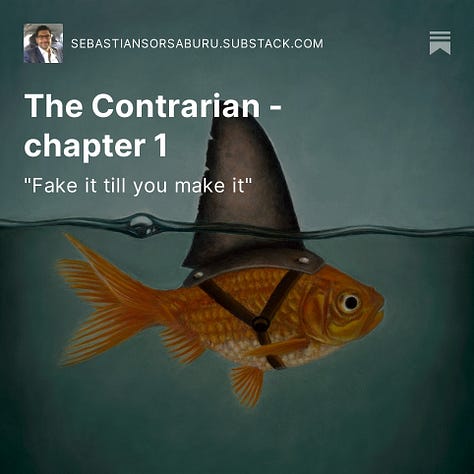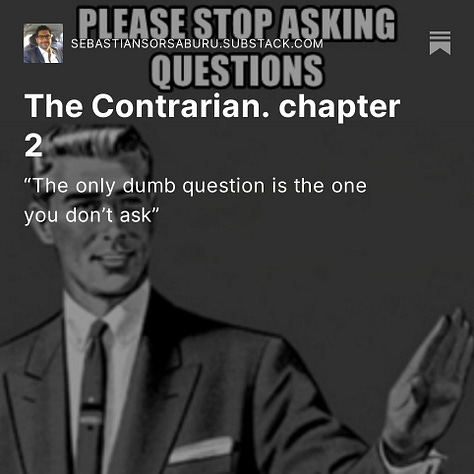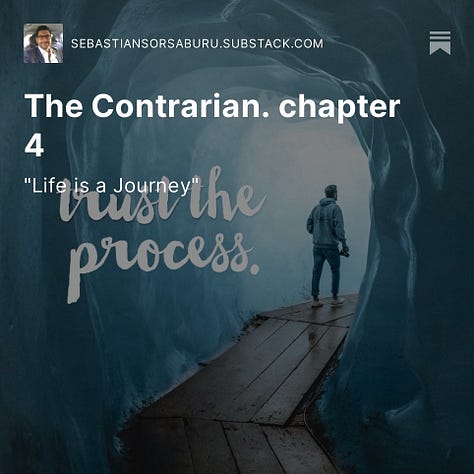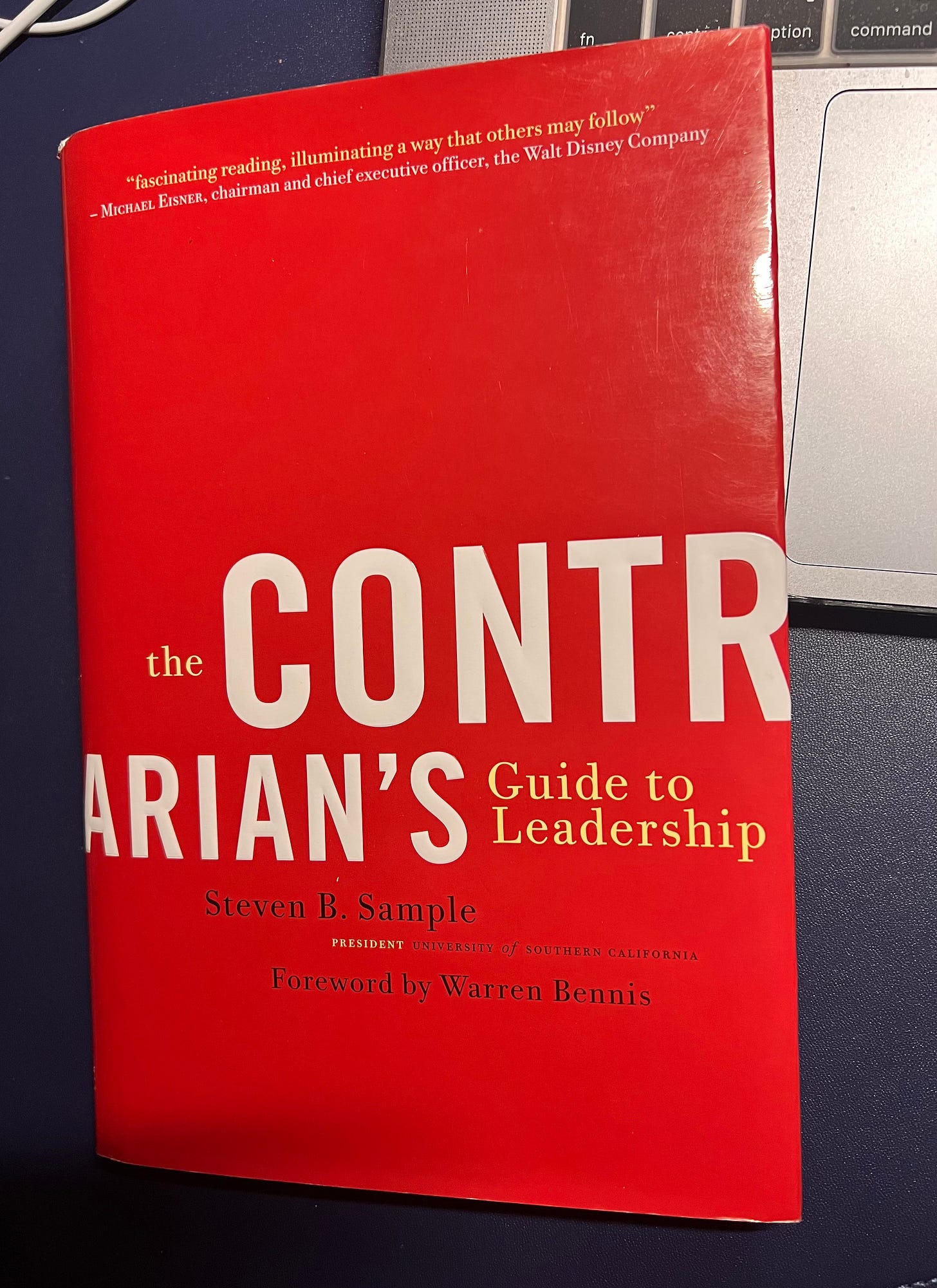“A contrarian isn’t one who always objects — that’s a conformist of a different sort. A contrarian reasons independently, from the ground up, and resists pressure to conform.”
Naval Ravikant
Welcome back to “Sebastian’s Leadership Reflections”
September 2023, year two!
I took the month of August to reflect on the first year of this “enterprise,” read and re-read, organize, take notes for fresh ideas, re-write some posts, and release all backdated editions of “Best of the Month” exploring what the best value-adding format could be.
I was getting ready to resume the writing when I had a call from my alter ego ,“The Contrarian,” who offered to kick-off the month with some of his unconventional thinking.
Today he brings a special edition, not the challenge to a commonly used phrase, but the method and principles he uses to shape his contrarian thinking.
He calls it THINKING GRAY, THINKING FREE!
Peter Thiel is a German-American lawyer, entrepreneur and venture capitalist, original co-founder of PayPal with Elon Musk. Thiel is a famous contrarian thinker, Stanford graduate and former teacher of a course on Entrepreneurism at Stanford. As a result of those classes a book was born: “Zero to One: Notes on Startups, or How to Build the Future”
In the book Thiel talks about the single best interview question you can ask someone:
What important truth do very few people agree with you on?
“This question sounds easy because it’s straightforward.
Actually, it’s very hard to answer.
It’s intellectually difficult because the knowledge that everyone is taught in school is by definition agreed upon.
And it’s psychologically difficult because anyone trying to answer must say something she knows to be unpopular.
Brilliant thinking is rare, but courage is in even shorter supply than genius.” (says Thiel in the book)
Peter Thiel goes on saying that some common answers people use to impress are: “Our educational system is broken and urgently needs to be fixed.” or “There is no God.”
But these are not good answers, because either true or false in the case of the first answer; or simply showing that you take one side of a debate in the case of the second answer, you are not truly presenting a contrarian position, you are just taking a position, you are not thinking deep and free enough.
Peter Thiel explains that a good answer to the question takes the following form: “Most people believe in x, but the truth is the opposite of x.”
Let me provide one of my possible answers to this question: What important truth do very few people agree with you on?
“Most people believe that entrepreneurship is the way to achieve success, happiness and find freedom in life, but the truth is that being an entrepreneur is only for a minority of people, the majority are not cut for that life, actually prefer predictable work arrangements and have more time for family and for themselves so they can perform other activities”
I’d love to read your contrarian statements in the comments section if you feel like giving it a try: What important truth do very few people agree with you on?
The origin story of “The Contrarian”
In the first year of “Leadership Reflections” I wrote six “Contrarian” newsletters, all under the following premise:
I decided to create a section called THE CONTRARIAN. Here I reflect on popular phrases and take the opposite side of their fundamental premise.
Even if there are relative truths to be found in them, I propose a contrarian view to the universal wisdom they claim.






If you haven’t been a regular reader of “The Contrarian” I suggest you give it a try, it will help you think gray and think free by challenging “conventional wisdom:”‘Fake it till you make it’
‘The only dumb question is the one you don’t ask’
‘Life begins at the end of your comfort zone’
‘Life is a journey’
‘Failure is not an option’
‘An Image is worth more than a thousand words’
Rather than writing the 7th contrarian newsletter today -believe me I have a lot of conventional wisdom to challenge- I will share some personal notes from the book that inspired much of my thinking on the matter, before I even read Zero to One:
“Contrarian leaders think different from the people around them. In particular, such leaders are able to maintain their intellectual independence by thinking gray, and enhance their intellectual credibility by thinking free”
In "The Contrarian's Guide to Leadership," Steven Sample blends historical retrospection with personal experiences, shaping new leadership paradigms.
He goes on saying that “conventional wisdom considers it a valuable skill to be able to make judgements as quickly as possible (…) contrarian wisdom argues that, for leaders, judgements as to the truth or falsity of information or the merits of new ideas should be arrived at as slowly and subtly as possible - and in many cases not at all”
F. Scott Firzgerald once described something similar to gray thinking when he observed that “the test of a first-rated mind is the ability to hold two opposing thoughts at the same time while still retaining the ability to function.”
There is no step-by-step formula for becoming a leader, even less a contrarian leader, but Steve Sample’s writing “pulls together a few contrarian principles to help a leader break free of the wisdom of the herd, and strike out in bold new directions.”
Think gray
try not to form firm opinions about ideas or people unless and until you have to. “Don’t form an opinion about an important matter, until you’ve heard all the relevant facts and arguments, or until circumstances force you to form an opinion without recourse to all the facts.”
Think free
train yourself to move several steps beyond “thinking outside the box” and “traditional brainstorming” by considering really outrageous solutions and approaches without restraints, or letting tested methods, passions and prejudices getting in the way.
Artful listening
listen first, talk later and when you listen, do so artfully. “The average person suffers from three delusions: (1) that he is a good driver, (2) that he has a good sense of humor, and (3) that he is a good listener.”
Experts: saviors and charlatans
“experts can be helpful but they are no substitute for your own critical thinking and discernment.” It’s necessary for an expert to be a ‘deep specialist’ and for a leader to be a ‘deep generalist’. The leader needs to be able to integrate the advice of different experts into a coherent course of action. Leaders should never become too dependent on experts, equally should never think that expertise can be a substitute for leadership.
Beware of pseudoscience
masquerading as incontrovertible fact or unassailable wisdom; it typically will do nothing to serve your interests or those of the organization you are leading.
Dig for gold: you are what you read
dig for gold in the super-texts (books of substance) while the rest stays mired down in trade publications, magazines and regular journals. You can depend on the people around you to give you any current news that really matter, don’t waste your time there, read books of endurance and influence that have passed the test of time, where true gold is hidden.
“In these tempestuous times it often appears that everything is changing, and changing at an increasingly rapid rate. In such an environment a leader can gain a tremendous competitive advantage by being able to discern the few things that are not changing at all, or changing only slowly or slightly. And nothing can help him do that better than developing a close relationship with a few of the supertexts.”
Give the Devil his due
“We must accept the fact that human beings and their institutions hardly ever measure up to our noblest ideals, and that to pretend otherwise is to invite ruin.”
Sample takes advice from Machiavelli’s, The Prince, who sheds light from the perspective of the author in the complexity of the human condition. People have capacity for both atrocity and altruism. The contrarian leader won’t be naive about the people and circumstances he’s dealing with.
Never make a decision
today that you can reasonably be put off to tomorrow, and never make a decision yourself that can reasonably be delegated to someone below.
Know which hill you’re willing to die on
“If a cat or dog or squirrel runs in front of your car, just steel yourself and kill it like a man. You have the responsibility not to endanger people in your car or in other cars by swerving in an effort to save the animal.”
This is hard to do, but absolutely critical if you want to protect your family in the car, your own life and the lives of others. What is important here is the idea of having a strong moral compass that will guide you to know what to say yes to and what to say no to. Moral choices can be incredibly complex. The ethical dimensions of leadership require you to ask difficult questions of ourselves first.
Work for those who work for you
“If a would be leader wants glamour, he should try acting in the movies. However, if he in fact wants to make a consequential impact on a cause or organization, he needs to roll up his sleeves and be prepared to perform a series of grungy chores which are putatively beneath him, and for which he’ll never receive recognition or credit, but by virtue of which his lieutenants will be inspired and enabled to achieve great things.”
Being president versus doing president
“The best physician won’t necessarily make a good hospital administrator or medical dean, the best engineer won’t necessarily make a good division president, the best teacher won’t necessarily make a good school principal, and the best athlete won’t necessarily make a good coach. There is no shame, and often much merit, in a person’s simply deciding he’s not cut out to have power and authority over, and responsibility for, a large number of followers.”
Ignore sunk costs
and yesterday’s mistakes! The decisions you make as a leader can only affect the future, not the past.
Stereotypes say that age leads to wisdom, but that’s far from the truth. Age doesn't necessarily lead to anything, experience and conscious living does. Expand your universe of experiences, be intentional with everything you do, don’t be a conformist, listen and observe a lot, and pay attention to detail. Wisdom will eventually knock at your door.
“The contrarian leader knows that he himself must answer the question of what’s right from both a worldly and a moral perspective. This at times will make his experience more exhilarating than that of other leaders, and at times more excruciating. But it will always be his experience -one for which he willingly takes responsibility. And what could be a greater or more meaningful adventure in leadership than that?”
Steve Sample's contrarian leadership practices invites leaders to shatter norms and embrace a complex mosaic of leadership strategies. By deciphering contextual landscapes his insights offer great resources to help become an effective -contrarian- leader.
A contrarian can notice what others only see!
Remember… “Brilliant thinking is rare, but courage is in even shorter supply than genius.” (Peter Thiel)
Bonus track: the ultimate “contrarian investor” quote: “We simply attempt to be fearful when others are greedy and to be greedy only when others are fearful.” – Warren Buffett
Stay tuned for the next edition of "The Contrarian," where unconventional insights confront conventional wisdom to keep you on your toes and illuminate the journey through independent thinking!
P.S. Before I go, here you have “The Treat,” where I share some of the music that kept me company while writing … Enjoy as you bid farewell to this post
“Lead yourself, Learn to live. Lead others, Learn to Build.”
If you enjoyed reading this post consider subscribing to the newsletter for free, joining the community and sharing your thoughts.










Welcome back to The Contrarian edition and best of luck in the second year of the Leadership reference! Thank you Sebastian for the learning opportunity and for the wisdom gained by reading these posts.
I started reading Zero to one few days ago and loving it so far. The question asked in the book and here, it's not an easy one and I admit the answer only came after reading how you would answer it... so thank you for that as well. I'll say that I strongly believe that not everyone can be a great leader no matter how many books they read or training they get. I can go into details of course but I'm curious, as a leader yourself, do you agree with my statement or not?